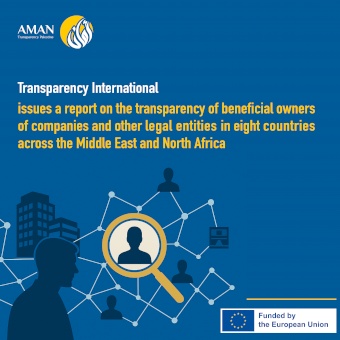
Berlin/Ramallah - Transparency International has issued its latest report assessing the extent to which beneficial ownership transparency is being implemented in eight countries in the Middle East and North Africa, namely, Algeria, Egypt, Jordan, Lebanon, Libya, Morocco, Palestine, and Tunisia. The report "Into the light: Benchmarking Beneficial ownership Transparency frameworks across MENA", indicated that there has been notable progress toward revealing the identities of the individuals who are the actual beneficiaries of humanitarian organizations, companies and trust funds, yet significant gaps still allow suspicious financial flows and persistent corruption in the region.
Transparency International’s assessment addresses a set of core components necessary for a successful transparency framework. This includes having a clear definition of beneficiaries, conducting regular risk assessments, ensuring the availability and the verification of accurate ownership information for companies and trusts, adhering to anti–money laundering obligations, and strengthening local and international cooperation. It also calls for banning financial tools that hide true ownership, such as bearer share certificates and nominee arrangements, thereby making financial transactions clearer and preventing their misuse or manipulation.
The Situation in Palestine
The report showed that efforts to strengthen transparency in Palestine have achieved tangible steps, yet still face practical challenges. The authorities have allowed the exchange of information among the relevant entities, enabling the monitoring of suspicious funds within a limited domestic scope. However, there are no comprehensive central registers of beneficial owners, and the verification and improvement of data accuracy remain only partial. The report noted that weak international cooperation in data exchange limits the ability of the Palestinian authorities to track funds flowing across borders, which is critically important for preventing the smuggling of money or the use of shell companies outside Palestine.
AMAN: Amend the Law to Require Companies to Publish the Names of Owners and Beneficial Owners
The report’s findings align with the recommendations of the Coalition for Integrity and Accountability (AMAN), which has called for amending the companies’ law requiring them to publish the names of their owners and beneficiaries, which it considers the right of citizens to access information related to those companies. The Coalition clarified that the current law, namely the companies’ Law by Decree No. 42 of 2021, does not require them to publish the names of their actual beneficiaries, which may impede the uncovering of conflicts of interest and instances of abuse of power. It also undermines fairness and competitiveness among companies and increases the risks of tax evasion and money laundering resulting from corruption crimes.
Focus Pillars According to the Report
The report indicates that the eight countries need to concentrate on three main pillars to strengthen beneficial ownership transparency. The first pillar involves conducting regular national risk assessments to ensure the identification of potential vulnerabilities. The second pillar includes guaranteeing access to accurate data through central beneficial ownership registers with continuous updating and verification. The third pillar consists of promoting local and international cooperation among authorities to trace suspicious funds and prevent their smuggling, thereby enhancing the countries’ ability to combat illegal financial activities effectively.
Recommendations of Transparency International
The organization recommends that governments, including Palestine, institutionalize regular risk assessments and share them with relevant authorities; establish central digital registers of beneficial owners to ensure accurate and accessible information for relevant bodies; and require registration authorities to verify data to guarantee its accuracy and timeliness. The recommendations also include registering both domestic and foreign trust funds to prevent the concealment of wealth and removing obstacles that hinder access to and effective use of beneficial ownership information. Additionally, the organization emphasizes the role of civil society and the media in monitoring information to ensure transparency and hold officials accountable.
The report, funded by the European Union under the “Transparency Now” project and in partnership between Transparency International and the United Nations Interregional Crime and Justice Research Institute (UNICRI), concludes that current progress in the region is promising but insufficient. The report emphasizes that continuing efforts to close existing gaps will strengthen anti-corruption measures and protect the people of the region from the impacts of public resource exploitation, particularly in Palestine, where strong coordination between local and international authorities is required to ensure the tracking of suspicious funds and prevent their smuggling.
To download the Transparency International report, click here.
